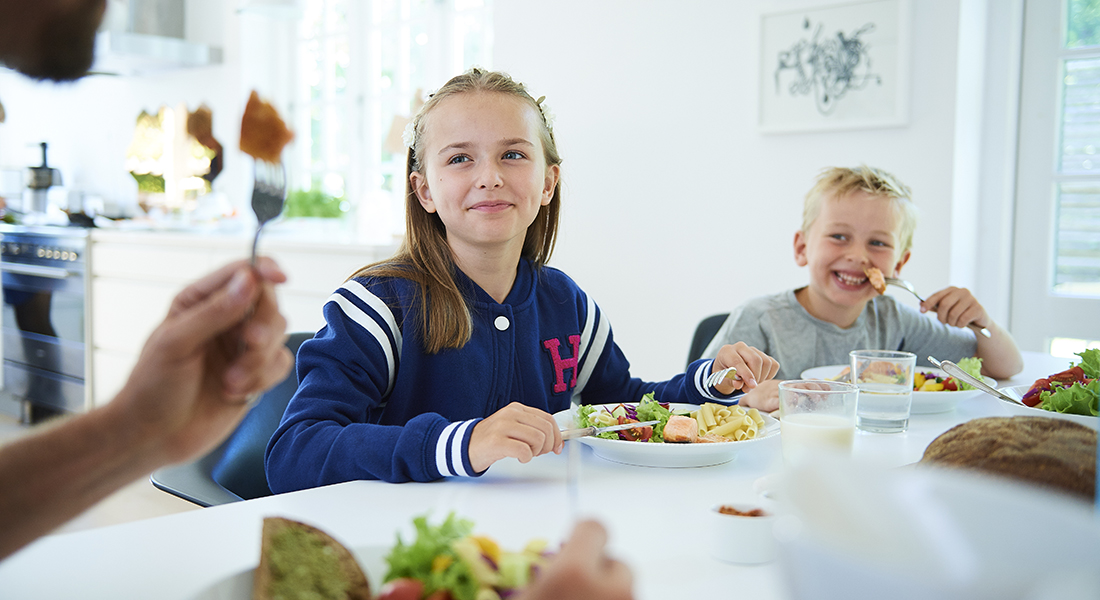Families with children should have more greens on their plates
A new research project aims to help families with children eat more plant-based foods and to study the health effects in both children and adults.

"Eat plant-rich, varied and not too much" is the first of the Danish Veterinary and Food Administration's official dietary guidelines. But lentils and cauliflower are not always at the top of children’s list of favourite dishes, and for many families it can be challenging to balance dietary recommendations, everyday routines and taste preferences.
GreenFamily is a new research project supporting Danish families with children in the transition towards a more plant-rich diet and healthier eating habits. The project develops tools to promote sustainable behaviour change and investigates how a plant-rich diet affects nutritional status, health and eating patterns among children and adults.
The project is a collaboration between the Department of Nutrition, Exercise and Sports, the Department of Psychology, and the Department of Food Science at the University of Copenhagen, together with the Danish Veterinary and Food Administration. GreenFamily has received 15 million DKK from the Plant-Based Food Grant (Plantefonden).
“We know that many families would like to eat more plant-rich foods, but that it can be difficult in a busy everyday life. With GreenFamily, we aim to create practical, knowledge-based solutions that make it easier to choose green meals. It is also crucial to identify the potential health effects of a plant-rich diet and to understand if there are specific aspects to pay attention to – especially concerning children’s nutrition,” says Associate Professor of children’s nutrition and health Camilla T. Damsgaard, Head of the GreenFamily project at the Department of Nutrition, Exercise and Sports.
A cross-disciplinary approach to new eating habits
As part of the project, researchers from Camilla T. Damsgaard’s team will follow 40 families with children aged 5–11 years over a 32-week period. For half of the time, families will follow a more plant-rich diet, while for the other half they will eat as usual.
This grant gives us a unique opportunity to bridge behavioural psychology and nutrition research, and by working with the Danish Veterinary and Food Administration, we can ensure that the tools we develop will truly benefit Danish families with children – which is incredibly meaningful.
To support families in complying with the Official Dietary Guidelines, they will receive meal kits with plant-based dishes. Researchers will then examine how a plant-rich diet affects the nutritional status, health, and gut microbiota of both children and parents – and whether dietary changes can help prevent lifestyle-related diseases.
GreenFamily combines nutritional science, behavioural psychology, sensory science and food pedagogics. This means that the project focuses not only on what families eat, but also on how to support change. A range of evidence-based tools – such as food guides, dialogue materials and nudging elements – will be developed and tested to make it easier and more appealing for families to change habits and foster healthy taste preferences in children.
At the end of the project, the Danish Veterinary and Food Administration will launch a campaign featuring selected tools to inspire and provide practical tips and guidance for families throughout the country.
About GreenFamily:
- GreenFamily runs from 2026 to 2029 and is supported by 15 million DKK from the Plant-Based Food Grant (Plantefonden).
- The project is led by Associate Professor and research group leader Camilla T. Damsgaard at the Department of Nutrition, Exercise and Sports, who for the past 15 years has studied the effects of fish, whole grains and school meals on children's health and nutritional status.
- The development of behavioural psychology tools is led by Professor and Head of Department of Psychology Annemarie Olsen, who has conducted extensive research on children’s taste and food neophobia.
- Analysis of the participants' gut bacteria are led by Professor Dennis Sandris Nielsen from the Department of Food Science.
- The final campaign aimed at families with children is led by special consultant Stine Vuholm, Unit for Sustainable Diet and Health at the Danish Veterinary and Food Administration, who is also involved in the project’s initial phases.
Contact
Camilla T. Damsgaard
Associate Professor of children’s nutrition and health
Mail: ctd@nexs.ku.dk
Phone: +45 3533 2221
Tania Maria Johannesen
Communications advisor
Mail: tania.johannesen@adm.ku.dk
Phone: +45 9356 5954
